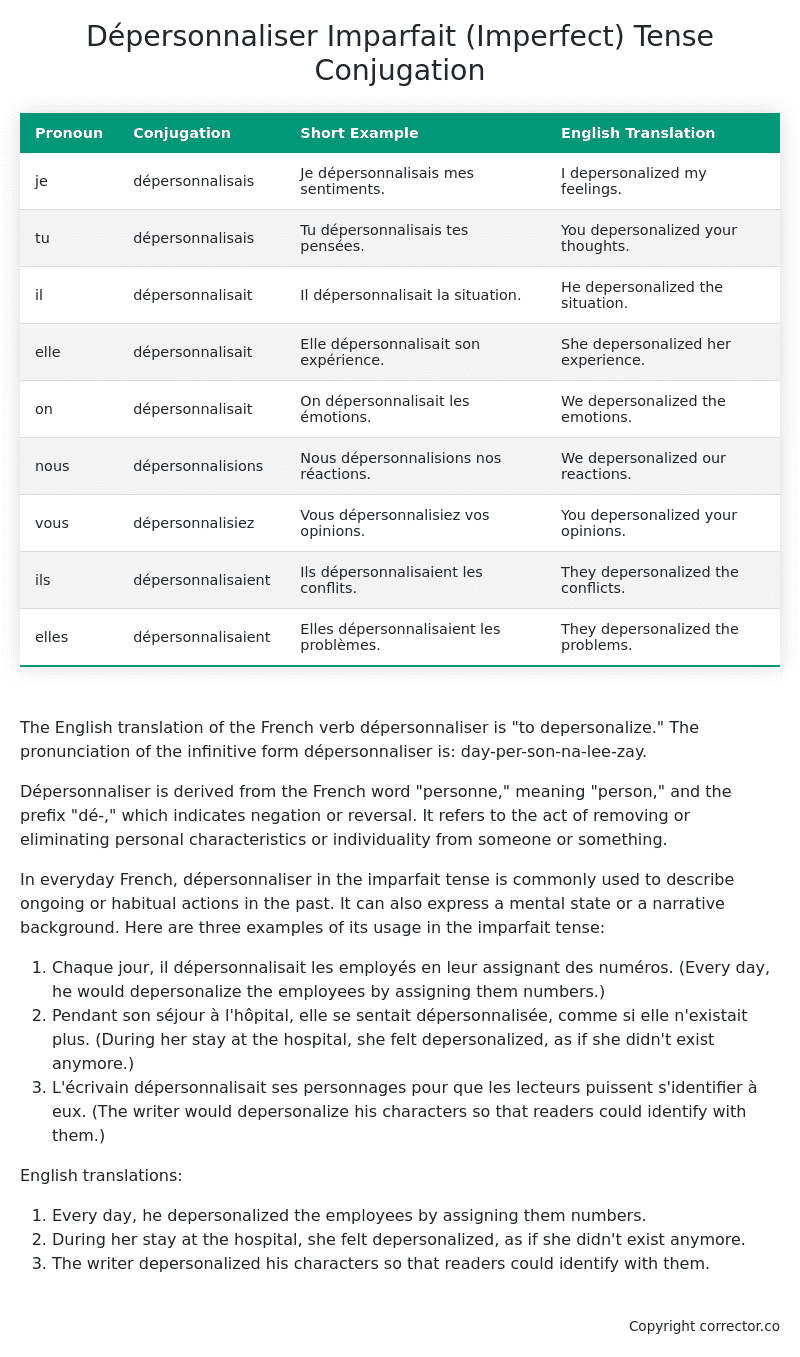Imparfait (Imperfect) Tense Conjugation of the French Verb dépersonnaliser
Introduction to the verb dépersonnaliser
The English translation of the French verb dépersonnaliser is “to depersonalize.” The pronunciation of the infinitive form dépersonnaliser is: day-per-son-na-lee-zay.
Dépersonnaliser is derived from the French word “personne,” meaning “person,” and the prefix “dé-,” which indicates negation or reversal. It refers to the act of removing or eliminating personal characteristics or individuality from someone or something.
In everyday French, dépersonnaliser in the imparfait tense is commonly used to describe ongoing or habitual actions in the past. It can also express a mental state or a narrative background. Here are three examples of its usage in the imparfait tense:
- Chaque jour, il dépersonnalisait les employés en leur assignant des numéros. (Every day, he would depersonalize the employees by assigning them numbers.)
- Pendant son séjour à l’hôpital, elle se sentait dépersonnalisée, comme si elle n’existait plus. (During her stay at the hospital, she felt depersonalized, as if she didn’t exist anymore.)
- L’écrivain dépersonnalisait ses personnages pour que les lecteurs puissent s’identifier à eux. (The writer would depersonalize his characters so that readers could identify with them.)
English translations:
- Every day, he depersonalized the employees by assigning them numbers.
- During her stay at the hospital, she felt depersonalized, as if she didn’t exist anymore.
- The writer depersonalized his characters so that readers could identify with them.
Table of the Imparfait (Imperfect) Tense Conjugation of dépersonnaliser
| Pronoun | Conjugation | Short Example | English Translation |
|---|---|---|---|
| je | dépersonnalisais | Je dépersonnalisais mes sentiments. | I depersonalized my feelings. |
| tu | dépersonnalisais | Tu dépersonnalisais tes pensées. | You depersonalized your thoughts. |
| il | dépersonnalisait | Il dépersonnalisait la situation. | He depersonalized the situation. |
| elle | dépersonnalisait | Elle dépersonnalisait son expérience. | She depersonalized her experience. |
| on | dépersonnalisait | On dépersonnalisait les émotions. | We depersonalized the emotions. |
| nous | dépersonnalisions | Nous dépersonnalisions nos réactions. | We depersonalized our reactions. |
| vous | dépersonnalisiez | Vous dépersonnalisiez vos opinions. | You depersonalized your opinions. |
| ils | dépersonnalisaient | Ils dépersonnalisaient les conflits. | They depersonalized the conflicts. |
| elles | dépersonnalisaient | Elles dépersonnalisaient les problèmes. | They depersonalized the problems. |
Other Conjugations for Dépersonnaliser.
Le Present (Present Tense) Conjugation of the French Verb dépersonnaliser
Imparfait (Imperfect) Tense Conjugation of the French Verb dépersonnaliser (You’re reading it right now!)
Passé Simple (Simple Past) Tense Conjugation of the French Verb dépersonnaliser
Passé Composé (Present Perfect) Tense Conjugation of the French Verb dépersonnaliser
Futur Simple (Simple Future) Tense Conjugation of the French Verb dépersonnaliser
Futur Proche (Near Future) Tense Conjugation of the French Verb dépersonnaliser
Plus-que-parfait (Pluperfect) Tense Conjugation of the French Verb dépersonnaliser
Passé Antérieur (Past Anterior) Tense Conjugation of the French Verb dépersonnaliser
Futur Antérieur (Future Anterior) Tense Conjugation of the French Verb dépersonnaliser
Subjonctif Présent (Subjunctive Present) Tense Conjugation of the French Verb dépersonnaliser
Subjonctif Passé (Subjunctive Past) Tense Conjugation of the French Verb dépersonnaliser
Subjonctif Imparfait (Subjunctive Imperfect) Tense Conjugation of the French Verb dépersonnaliser
Conditionnel Présent (Conditional Present) Tense Conjugation of the French Verb dépersonnaliser
Conditionnel Passé (Conditional Past) Tense Conjugation of the French Verb dépersonnaliser
Conditionnel Passé II (Conditional Past II) Tense Conjugation of the French Verb dépersonnaliser
L’impératif Présent (Imperative Present) Tense Conjugation of the French Verb dépersonnaliser
L’impératif Passé (Imperative Past) Tense Conjugation of the French Verb dépersonnaliser
L’infinitif Présent (Infinitive Present) Tense Conjugation of the French Verb dépersonnaliser
L’infinitif Passé (Infinitive Past) Tense Conjugation of the French Verb dépersonnaliser
Le Participe Présent (Present Participle) Tense Conjugation of the French Verb dépersonnaliser
Le Participe Passé (Past Participle) Tense Conjugation of the French Verb dépersonnaliser
Struggling with French verbs or the language in general? Why not use our free French Grammar Checker – no registration required!
Get a FREE Download Study Sheet of this Conjugation 🔥
Simply right click the image below, click “save image” and get your free reference for the dépersonnaliser imparfait tense conjugation!

Dépersonnaliser – About the French Imparfait Tense
NOTE: To take a deep dive into all the French tenses then see our article on Mastering French Tense Conjugation.
Formation of the Imparfait Tense
For regular -er verbs:
For regular -ir verbs
For regular -re verbs
Common Everyday Usage Patterns
Description of Past Habits
Background Information
Mental and Emotional States
It’s employed to express emotions, thoughts, or physical sensations in the past. For example: “J’étais content quand il est arrivé.” (I was happy when he arrived.)
Ongoing Actions
Points to Note About the Imparfait Tense
Passé Composé vs. Imparfait
Conditional
Si Clauses
Narration
I hope you enjoyed this article on the verb dépersonnaliser. Still in a learning mood? Check out another TOTALLY random French verb imparfait conjugation!


